
Health care leaders share why they think drug price controls don’t work
Most Americans — 66 percent — report that the cost of their prescription drugs has risen since 2017. High drug costs are a big concern in the United States. Thankfully, there are many solutions lawmakers could implement that would control drug price inflation.
Drug price controls are not one of those solutions.
Unfortunately, the House-passed H.R. 3 would enact this policy. Proponents of this measure claim that simply mandating a lower price for prescription drugs will solve the problem. But fixing prices never works. Invariably, this policy makes lifesaving drugs harder to access, crushes innovation, and does nothing to help patients.
Patients would be left without the drugs they need — and lawmakers would boast that they “lowered” prices.
Here’s what health care leaders and lawmakers are saying about drug price controls.
Former Health and Human Services Secretary Tom Price: Drug price controls would “rob patients of innovative and new therapies and treatments”
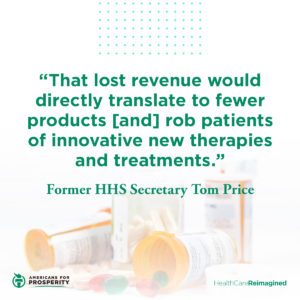
According to former Health and Human Services Secretary Tom Price,
“It may be difficult to feel sympathy for drug companies. They are often painted as the bad guy. But that lost revenue would directly translate to fewer products brought to market as research and development budgets dwindle, which would then rob patients of innovative new therapies and treatments.”
Drug price controls might “lower” the price of drugs in theory, but they also remove those drugs from the market, meaning that patients won’t be able to access them at all. Why?
- Pharmaceutical companies would be less able to engage in research and development if drug prices were capped. The White House Council of Economic Advisers warned against implementing this policy, finding that drug price caps would cut pharmaceutical industry revenues by $500 billion to $1 trillion over a decade, and drug companies would cut research and development spending by $75 billion to $200 billion during that period.
- Capping the price for drugs, as countries such as France, South Korea, and Canada have done, makes it much more difficult to import drugs, resulting in shortages.
As Representative Scott Peters put it,
“It’s a better problem to have a cure or therapy that’s expensive and have to figure out how to get it to people than it is to not have the cure at all, and I’m afraid that’s what this version of H.R. 3 would leave us with.”
Implementing this policy here would be devastating for millions of American patients who rely on lifesaving drugs. It would give them fewer options in their health care, with deadly results.
Pacific Research Institute’s Wayne Winegarden: Drug price controls are limiting European patients’ ability to access the medicine they need
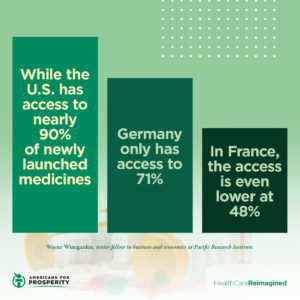
In an article for Forbes, Wayne Winegarden, senior fellow in business and economics at Pacific Research Institute and director of PRI’s Center for Medical Economics and Innovation, describes the effect drug price controls are having on European patients’ ability to access medicines:
Since the implementation of price controls, research spending in the EU has stagnated, much of it diverting to the U.S. where price controls do not exist. Over time, these diverging trends have enabled the U.S. to become the global innovation leader.
As a result, the EU has endured many adverse consequences. Access to existing medicines have faltered. While the U.S. has access to nearly 90% of newly launched medicines, patients in Germany only have access to 71%. In France, the access rate is even lower at 48%.
Winegarden then warns the U.S. concerning H.R. 3:
“History clearly illustrates that government mandated prices create more harm than good. Should drug price controls, such as H.R. 3, be implemented, the U.S. will not be exempt from the adverse consequences. Instead, access will be reduced, innovation will suffer, and the economy will be less vibrant.”
In addition to making existing drugs difficult to access, drug price controls prevent the creation and importation of new drugs, as well.
These price caps produce poor results for the countries in which they’re implemented.
Drug price caps have limited access to essential drugs and COVID vaccines in several countries
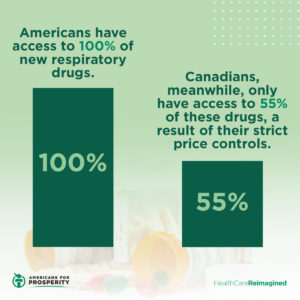
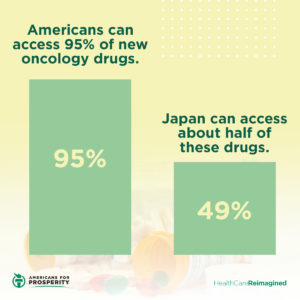
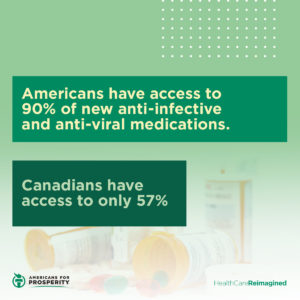
Because of drug price controls:
- Americans have access to 100 percent of new respiratory drugs. Canadians, meanwhile, only have access to 55 percent of these drugs, a result of their strict price controls.
- Americans can access 95 percent of new oncology drugs. Japan can access about half of these drugs.
- Americans have access to 90 percent of new anti-infective and anti-viral medications. Canadians have access to only 57 percent.
Drug price fixing produced a similar result in Canada this year when it came to their vaccination effort.
Forty-two percent of Americans have been fully vaccinated against COVID-19. Only 8.5 percent of Canadians have been fully vaccinated.
Why such a large disparity? In part, Canada’s price controls priced the country out of the market for vaccines.
That isn’t a small error. Canada’s price controls cost lives.
A poor solution to the shortcomings of the U.S. health care system
Drug rationing won’t do much to help patients here at home with the rest of their health care needs, either.
Paul Pescatello, executive director of the Connecticut Bioscience Growth Council, explains:
“Controlling drug prices will not do anything about other factors, including hospitalizations, doctors visits, administration, and government fees, taxes, and benefit mandates.”
Drug price controls are a poor solution to America’s health care shortcomings. They would do little to lower the cost of drugs — and much to reduce their availability — and even less to address what Americans actually want in their health care.
Our health care system doesn’t need additional mandates and regulations. Those are the cause of, not the solution to, what ails our system.
Rather than more restrictions, Americans want more control over their health care. That’s why a personal option would help patients access the quality, affordable care they need.
To that end, Congress should:
- Encourage the Food and Drug Administration to approve generics and biosimilar drugs to lower drug prices.
- Lower barriers to the importation of drugs approved by advanced nations whose regulatory agencies we trust.
- Expand tax-free health savings accounts to allow more people to save for medical expenses and even directly fund HSAs for those in need.
These policies would provide better care for all Americans. In the meantime, Congress should reject H.R. 3.
Learn more about how the personal option would work and tell lawmakers to reject drug price controls and other harmful measures that would place additional regulations on our health care system.


